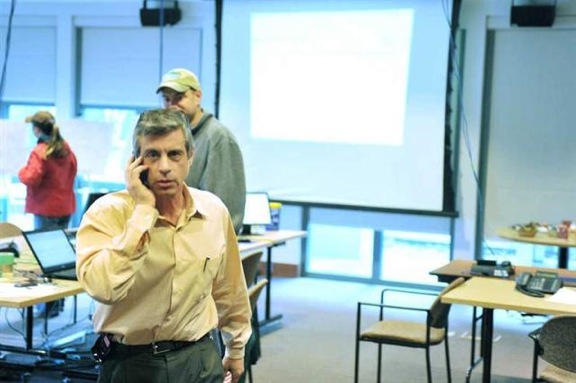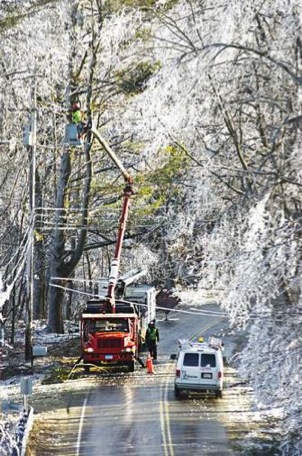
Sunday, January 9, 2011
Unitil works beyond its PR
Disaster is ultimate test of confidence in utility
By George Barnes TELEGRAM & GAZETTE STAFF gbarnes@telegram.com

Richard L. Francazio, Unitil emergency services director, answers his cellphone while acting as incident commander in the Unitil Emergency Operations Center during a February 2010 windstorm in which 63,000 New Hampshire customers lost power.
(PHOTO COURTESY OF UNITIL)
FITCHBURG — At 8:55 a.m. Jan. 2, Alec O'Meara tweeted that 250 Unitil customers were without power and crews were on the way.
That was the bad news. The good news came 20 minutes later, when another Twitter feed reported all 250 customers restored as of 9:15 a.m. The culprit was identified as a pesky squirrel.
Three weeks ago, Twitter became the latest tool in Unitil's effort to keep customers informed and respond quickly and effectively when a major storm hits. The messages kept Fitchburg in the loop about last week's localized problem, but it was used more extensively a week earlier during the Dec. 26-27 snowstorm that hit the Northeast.
Unitil is working to improve its service and attempting to repair its image tarnished two years ago by the Dec. 11-12 ice storm that devastated communities in north Central and Eastern Massachusetts and Southern New Hampshire. The storm and its aftermath left the company with a black eye, especially in Fitchburg and other communities it serves in north Central Massachusetts. It is a disaster people still regularly talk about when they meet in coffee shops and grocery stores. The storm left its mark on both the people who lived through it and Unitil.
Left without power in some cases for two weeks, residents and business owners in Fitchburg, Ashby, Lunenburg and Townsend were furious with the company. They picketed its office at 285 John Fitch Highway, created committees to explore having their communities leave Unitil and set up their own municipal power companies, and packed meetings in Boston to demand the state take action against the corporation.
Protesters even showed up last month to mark the second anniversary of the ice storm and call for the Legislature to pass a bill making it easier for communities to create their own municipal light companies.
Mr. O'Meara, media relations manager for Unitil, was hired after a February 2010 windstorm that caused power line damage equal to the ice storm. He was hired as part of an effort to improve the power company's communications with its customers and said Unitil understands it will not be easy to convince customers that it is working to improve service. There is still a lot of suspicion and bitterness over the ice storm.

In the aftermath of the Dec. 11-12, 2008 ice storm, a crew trims tree limbs resting on utility lines along Route 56 in Rutland.
(T&G Staff File Photo / DAN GOULD)
“We have to prove it through action,” he said. “The only way we're going to earn trust is by keeping the lights on,” he said.
A recent freak accident in which a pole being installed by a Unitil crew rolled down a hill and pierced the side of a house in Fitchburg did not help the company's image, but Mr. O'Meara said Unitil is hoping customers will see the company has significantly improved its storm response.
In Fitchburg, Unitil went into the ice storm with critics already concerned about its rates and other issues. The ice storm turned that unhappiness into anger. State Rep. Stephen L. DiNatale, D-Fitchburg, is one of Unitil's most ardent critics and still has concerns about the company. He acknowledges some positive changes since the ice storm. First, he said he sees as a plus the hiring of Richard L. Francazio, a veteran of National Grid, as Unitil's director of emergency management. The company also hired Mr. O'Meara's boss, Carol Valianti, as vice president of communications and public affairs in 2009 in an effort to improve communications with the public and press.
Mr. DiNatale sees another positive in the changes made to Unitil's Fitchburg Gas and Electric John Fitch Highway office, to allow it to be used as a local storm center capable of maintaining communications among the company, local officials and emergency personnel.
The representative wants the company to focus on maintaining its infrastructure, including lines, poles and the level of voltage in the system. He also said the company's rates are high, and that should be addressed. Mr. DiNatale said he supports the bill giving communities more latitude to form their own utilities.
Fitchburg Mayor Lisa A. Wong said the biggest step the utility could take is to lower its rates and be more competitive with other utilities around the state. The mayor also wants to hear more specifics about how the company plans to deal with the next big storm. She said what she has heard so far is general information, and it is how Fitchburg has been dealing with storms since the 1970s.
In New England, proving your worth as a utility is not a simple task. In New Hampshire, the February windstorm knocked out power to 63,000 Unitil customers. Its 90 mph winds snapped trees and telephone poles. It was the second-largest storm in New Hampshire history, a true disaster, but also a good test of Unitil's improved emergency response system — the first major test of its instant command structure.
To deal with the disaster, a regional command center was set up in Unitil's home base of Hampton, N.H., and employees throughout the company were activated to serve in their storm roles, as well as performing their regular jobs. The company had power restored in four days.
Since the ice storm, the company has been working to change how it does business. It now has a policy in which planning for storms begins three days prior to the event, going to various levels of readiness as the severity of the storm becomes clear. This weekend the company was watching the weather, but expecting few problems.
Mr. O'Meara said Unitil has also recently spent $28 million upgrading its infrastructure. As an example, he said the new lines being installed on Highland Avenue in Lunenburg are of new material better able to withstand falling branches and ice. He said the company has taken several other steps to improve response, including training gas workers to assist at sites where electrical wires are down, increasing the number of contract crews to hire in an emergency and cross-training all its employees so each has a specific job during a crisis, in addition to regular duties.
Mr. O'Meara is also going directly to residents through a series of Fitchburg Access Cable Television shows, to talk about what Unitil does and how it hopes to serve the residents of the area, both in crisis times and generally.
Kirk Hazlett of Belmont, a member of the board of directors of the Public Relation Society of America, said that repairing a damaged image is not simple. It requires commitment by a company to change. He said that the first steps in a crisis are significant, and it may be where Unitil stumbled during the ice storm.
“The first thing, and this may sound simple, is you need to get folks inside the company to admit, yes, we have a problem,” he said.
Mr. Hazlett, who is also an associate professor of communications at Curry College, said that once a problem is acknowledged, communication with all stakeholders is key.
“Tell me you are doing something, even if it is to say I have a team in place there and you are assessing the situation,” he said.
Mr. Hazlett said it is critical for the people affected to know that the company understands how they have been affected, and that actions speak louder than words. He said company representatives should be meeting with people and showing they understand what needs to be done during a disaster. He said people, even in a situation affecting just a single house, need to know the company is working to fix the problem.
Once the crisis is over, if the company has failed to meet expectations, it needs to look at improving what it does.
“When something like this happens, your public forgets all the good stuff you do, and it takes a long time to rebuild trust,” Mr. Hazlett said. It could take Unitil two to three years to rebuild its image, and it may take another disaster to do that, he added.
“Hopefully this has been a significant learning experience for them,” he said.
